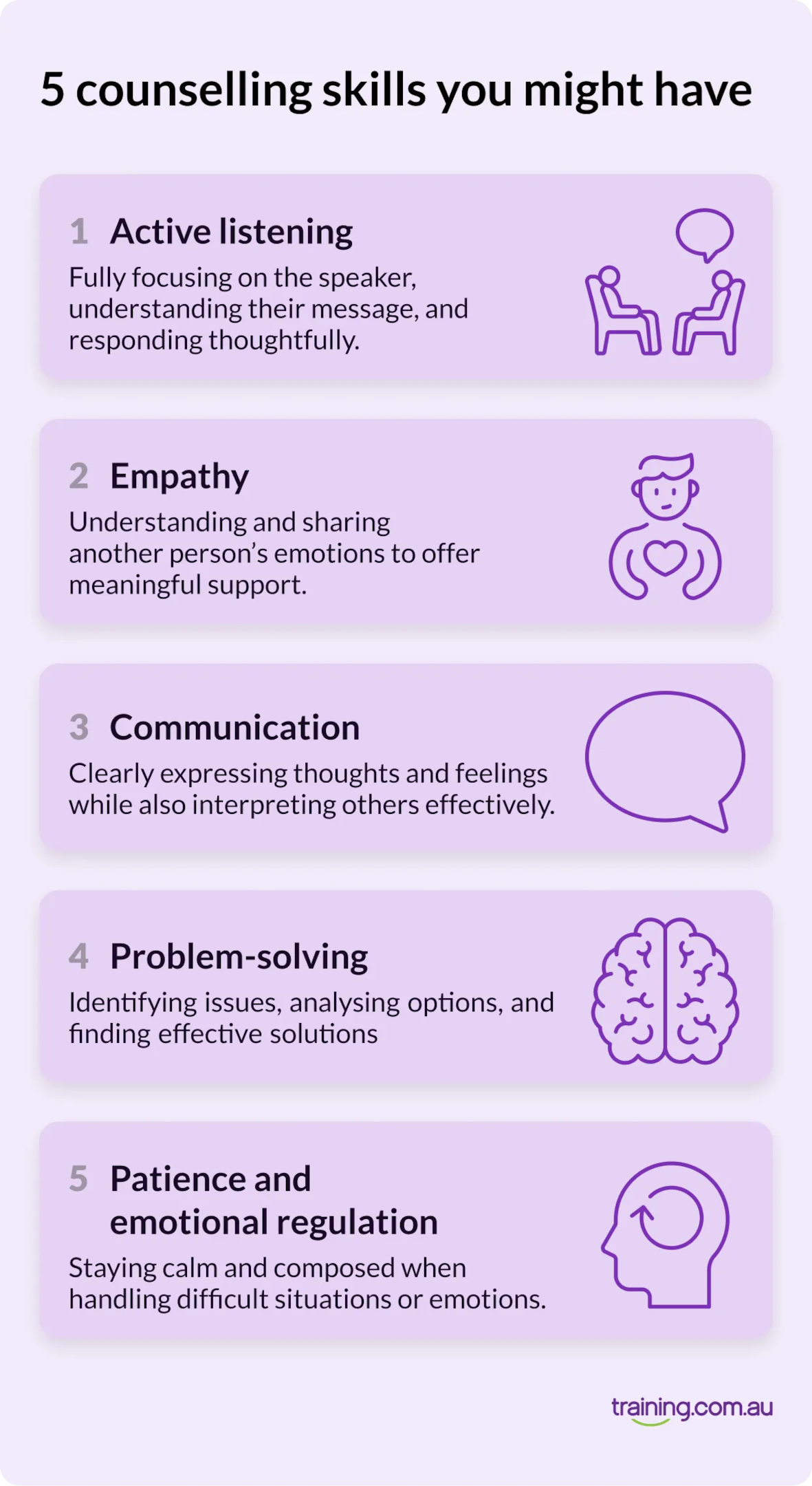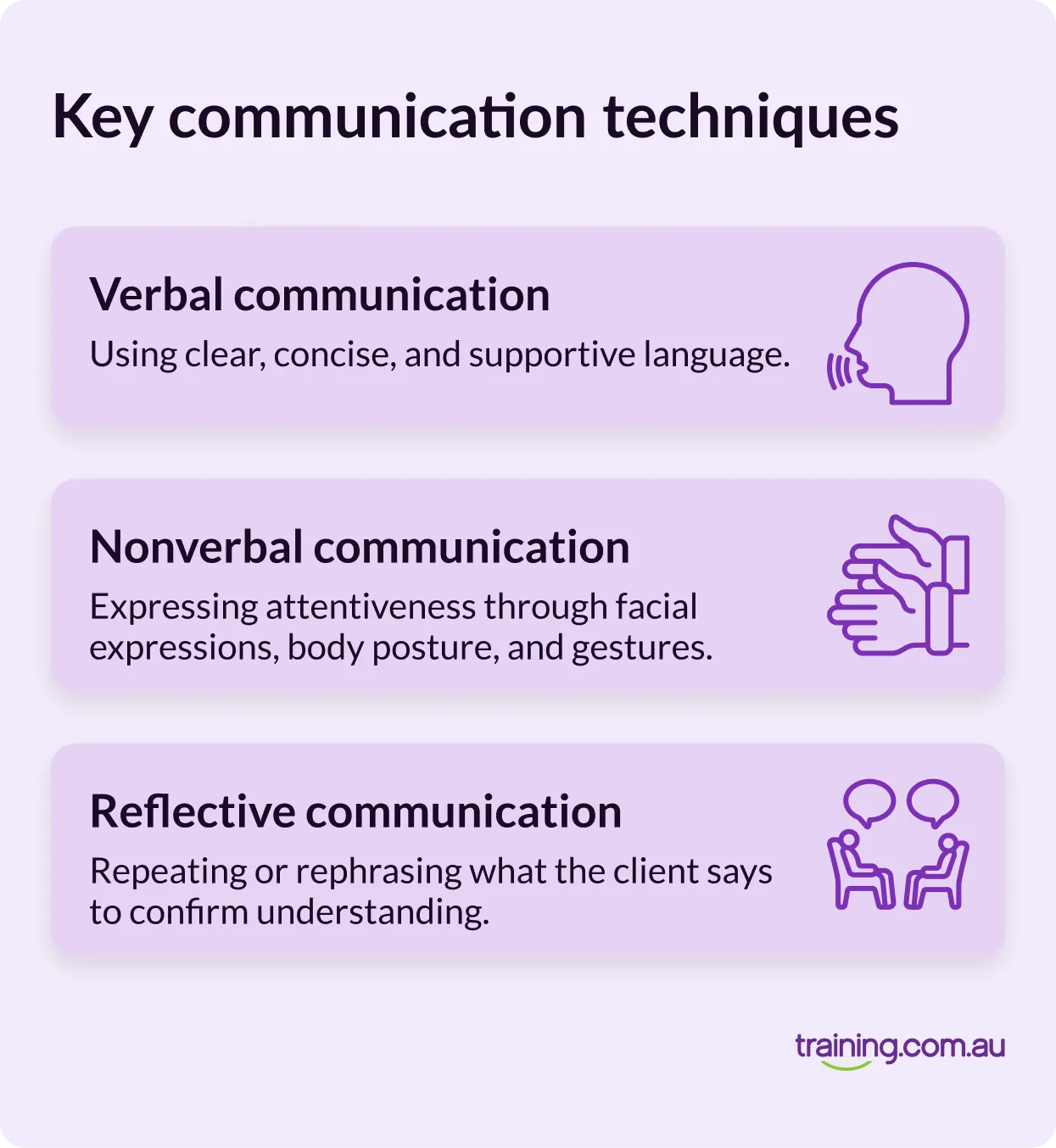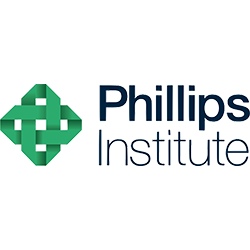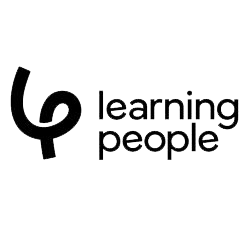5 Counselling Skills You Might Already Have

Counselling is a valuable profession that requires a unique set of social and communication skills. If you’re thinking about a career in counselling, you may already have some basic counselling skills that you can continue to improve.
To support their clients, counsellors need to develop qualities such as empathy, patience, and flexibility. Continuing professional development also helps counsellors stay updated with advancements in their field, ensuring they provide the best possible support.
This article breaks down five essential counselling skills you might already have and how to succeed in this profession.
What are counselling skills?
Definition of counselling Skills
Counselling skills are a set of essential techniques and strategies used by counsellors to facilitate effective communication, build trust, and establish a strong therapeutic relationship with clients. These skills are designed to help clients explore their thoughts, feelings, and behaviours and work towards achieving their personal goals and overcoming challenges.
Counselling skills are not limited to professional counsellors and therapists, but can be applied in various settings, including education, healthcare, and business, to improve communication and relationships.
What skills do I need to become a counsellor?
- Active listening
- Empathy
- Communication
- Problem-solving
- Patience and emotional regulation

1. Active listening
What is active listening?
Active listening involves fully concentrating on what the speaker is saying rather than just passively hearing the words. It helps clients feel understood and valued, a crucial component in any counselling relationship.
How active listening helps in counselling
Actively listening encourages clients to share their thoughts freely. It builds trust and rapport between the counsellor and client and helps counsellors gather relevant information for effective guidance.
How to improve active listening
- Maintain eye contact and use open body language.
- Paraphrase what the client says to ensure understanding.
- Avoid interrupting or jumping to conclusions.
- Use clarification to uncover the root of issues by seeking more details when something is unclear.
2. Empathy
What is empathy?
Empathy is the ability to understand and share another person’s feelings. It’s a critical counselling skill that allows professionals to connect with clients on a deeper emotional level.
Why is empathy Important in counselling?
- Helps clients feel understood, reducing feelings of isolation.
- Encourages open and honest communication.
- Strengthens the therapeutic relationship between the counsellor and client.
Ways to develop empathy
- Practice perspective-taking by imagining yourself in the client’s situation, being present and adaptable to their needs.
- Use open-ended questions to explore the client’s emotions.
- Validate the client’s experiences without judgment.
3. Communication skills
What are communication skills in counselling?
Effective communication, which includes effective counselling skills, is essential for delivering guidance, clarifying confusion, and fostering meaningful conversations between a counsellor and their client.

How to improve communication in counselling
- Be mindful of tone and body language.
- Encourage clients to express themselves freely.
- Ask open-ended questions to promote discussion.
4. Problem-solving ability
What is problem-solving in counselling?
Problem-solving means helping clients face challenges. It also involves finding solutions that match their values and situations. Visualisation can provide insight into how clients interpret events problematically, offering a unique perspective that can guide the problem-solving process.
Why is problem-solving important in counselling?
- Problem-solving is a valuable skill that enables clients to find constructive ways to overcome obstacles.
- Encourages self-reflection and self-awareness.
- Helps clients develop coping strategies for future difficulties.
How to enhance your problem-solving skills
- Use goal-setting techniques to outline achievable steps.
- Help clients explore multiple perspectives before making decisions.
- Encourage self-directed solutions rather than providing direct answers.

Looking for a mental health professional?
If you’re looking for compassionate and professional mental health support, check out the Daily Psychology. Cecilia Daly, an experienced psychologist, offers a range of services to help individuals, couples, and families navigate life’s challenges.
Get in Contact5. Patience and emotional regulation
Why is patience important for counsellors?
Patience helps counsellors stay calm and supportive. This is important when clients have trouble expressing their thoughts or dealing with emotional pain.
How emotional regulation supports counselling
- Prevents counsellors from reacting impulsively to difficult situations.
- Helps maintain a professional and composed demeanour, which is essential for advancing the therapeutic process.
- Ensures that clients feel safe and heard during counselling sessions.
Tips for building patience and emotional regulation
- Practice mindfulness and stress management techniques.
- Develop a habit of deep breathing before responding to clients.
- Set realistic expectations for client progress.
- Encourage clients to use self-talk as a valuable intervention for coping with stress and anger, helping them manage their emotions effectively.

New to counselling? Start here
Not sure where to begin with counselling? We’ve created a complete guide that walks you through the qualifications, skills, and pathways to get started.
Read the GuideBuilding rapport and establishing trust
Techniques for building rapport
Building rapport and establishing trust are crucial components of the counselling process. Rapport refers to the connection and understanding between the counsellor and client, while trust is the foundation of a successful therapeutic relationship. Techniques for building rapport include:
Active listening
Giving the client your full attention and using verbal and nonverbal cues to show engagement and understanding.
Empathy
Understanding and sharing the client’s emotions and perspectives.
Nonverbal communication
Using body language, facial expressions, and tone of voice to convey empathy and understanding.
Open-ended questioning
Asking questions that encourage the client to explore their thoughts and feelings.
Reflection
Reflecting the client’s words, emotions, and experiences to demonstrate understanding and empathy.
By using these techniques, counsellors can establish a strong therapeutic relationship, build trust, and create a safe and supportive environment for clients to explore their concerns.
Applying counselling skills in everyday life
Importance of counselling skills in personal and professional relationships
Counselling skills are not limited to the counselling room but can be applied in everyday life to improve personal and professional relationships. Effective communication, active listening, and empathy are valuable skills that can be used in various settings, including:
Personal relationships
To improve communication and understanding with family and friends.
Professional relationships
To build trust and establish strong working relationships with colleagues and clients.
Education
To create a supportive learning environment and improve student-teacher relationships.
By applying counselling skills in everyday life, you can improve your communication skills, build stronger relationships, and enhance your personal and professional growth.
Counselling is a rewarding career built on connection, communication, and empathy — and chances are, you already have some of the foundational skills it requires. By recognising and developing these everyday strengths, you’re well on your way to making a real impact in people’s lives.
If you’re ready to turn your potential into a professional pathway, explore counselling courses and take the first step toward a meaningful career.
Browse Counselling Results
Certificate II in Animal Care E1399
If you love animals and are passionate about promoting their welfare, then a job in animal care could be perfect for you. This course will provide an excellent foundation for your career in animal care. Throughout the course you will gain first-hand ex...
Certificate III in Non-Emergency Patient Transport (VIC Only) HLT31120
Our Promise We are confident in the delivery of our training. On successful completion of the course, graduates will be guaranteed a telephone interview for vacant Patient Transport Officer positions in the Non-Emergency Patient Transport division. So...
Certificate IV in Ageing Support CHC43015
Do you already work in aged care and now you’re ready to up-skill? Would you like to have your existing competency recognised? Perhaps you’d like to learn something new, update your team-leading skills and contribute to improved accreditation outcomes...
Certificate IV in Finance and Mortgage Broking
Find a rewarding career helping individuals and businesses in securing loans and managing their finances. Your expertise can make a significant difference in their lives. Embarking on a career in finance and mortgage broking offers the opportunity for...
Certificate IV Celebrancy CHC41015
Are you looking for a rewarding career that will give you both financial and emotional fulfilment? When you study the Certificate lV in Celebrancy course with Rose Training you will gain the skills needed to become a professional marriage celebrant, wh...
Front-End Web Development: Transform
Front-End Web Development: Transform – 12 months of access, can be completed in 3 months (any-time enrolment, part-time, online) Begin your front-end web development career with hands-on coding experience, expert mentorship, and real-world projects. In...
Digital Marketing: Transform
Digital Marketing: Transform – 12 months of access, can be completed in 3 months (any-time enrolment, part-time, online) Embark on your digital marketing career with hands-on experience, expert mentorship, and practical campaign projects. In just 3 mon...
Data Analytics: Transform
Data Analytics: Transform – 12 months of access, can be completed in 3 months (any-time enrolment, part-time, online) Kickstart your data analytics career with hands-on projects, expert mentorship, and real-world business data. In just 3 months, start...
Cyber Security Analytics: Transform
Cyber Security Analytics: Transform – 12 months of access, can be completed in 3 months (any-time enrolment, part-time, online) Launch your cyber security career with hands-on skills, expert mentorship, and exposure to real-world threat simulations. In...
Systems Security Certified Practitioner (SSCP)
Why choose the Systems Security Certified Practitioner (SSCP)? The SSCP certification is recognised internationally as a benchmark for IT security expertise and is designed to validate the knowledge and skills necessary to implement, monitor and admini...
Project Management Professional – PMP
Why choose the Project Management Professional – PMP? The Project Management Professional Course is an in-depth course that enables project professionals to significantly improve their understanding of the intricacies and challenges of Project Manageme...
PRINCE2® Practitioner
Why choose the PRINCE2® Practitioner? If you’re looking to build on your foundational understanding of PRINCE2® Project Management methodology then this course is for you. PRINCE2® (Projects IN Controlled Environments) is a globally recognised framewor...
PRINCE2® Pathway
Why choose the PRINCE2® Pathway? PRINCE2® is a globally recognised project management methodology, and its adaptability lets you manage projects of all sizes, using industry best practice. Passing the PRINCE2® Foundation certification demonstrates your...
PRINCE2® Foundation
Why choose the PRINCE2® Foundation? PRINCE2® is the global standard for project management, and this certificate gets you well on the way to a rewarding and lucrative role as a project manager. The course will give you a clear understanding of the PRIN...
PRINCE2® Agile Practitioner
Why choose the PRINCE2® Agile Practitioner? PRINCE2® is a globally recognised project management methodology, and its adaptability lets you manage projects of all sizes, using industry best practice. The PRINCE2® Agile Practitioner course is an extensi...
PMP and Change Pathway
Why choose the PMP Pathway? Providing a senior level training in Project Management, plus the foundations of Scrum and Agile. Our PMP Pathway elevates your expertise in Project Management and widen your skill sets too. By completing this pathway, you’l...
PMP Pathway
Why choose the PMP Pathway? Providing a senior level training in Project Management, plus the foundations of Scrum and Agile. Our PMP Pathway elevates your expertise in Project Management and widen your skill sets too. By completing this pathway, you’l...
PMI Agile Project Management
Why choose the PMI Agile Project Management? The PMI Agile Certified Practitioner (ACP) course is a professional certification which works to enhance your ability to bring agility and self-sufficiency in project management. Agile projects involve self-...
PMI Agile Certified Practitioner (ACP)
Why choose the PMI ACP? The PMI Agile Certified Practitioner (ACP) course is a professional certification which works to enhance your ability to bring agility and self-sufficiency in project management. Agile projects involve self-empowered teams that...
Networking Career Starter Pathway
Why choose the Networking Career Starter Pathway? Our Networking Career Starter Pathway helps you to efficiently launch or advance your IT networking career. Covering the fundamentals of computing, networking, security, routing, and switching, each ste...
Online courses also available
Latest Articles
The Future of Counselling Jobs in Australia
Thinking about a career in counselling? You might wonder—is it a good career choice right now? Will...
How to Get Your Counselling Accreditation and Registration
Embarking on a counselling career in Australia offers a fulfilling opportunity to support people in...
What Are Counselling Microskills?
Microskills are fundamental communication techniques used to build rapport, actively listen, and gui...
Want to read more?
How to Become a Translator
Do you have strong language skills? Work with your mother tongue and another language as a professio...
Career Quiz Results: The Informer
You are The Informer! You'll shine in a job that involves researching, analysing and communicating k...
UI Design Careers: An Expert Shares 5 Things You’ll Want to Know
Considering a creative career in UI Design? A UI design lead with 15 years experience supplies the l...







